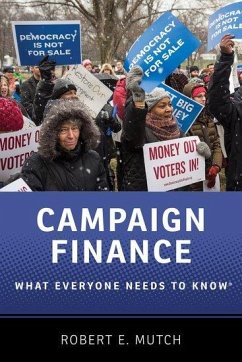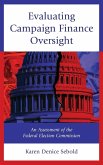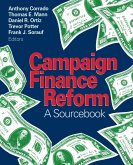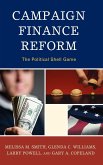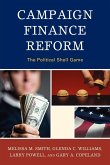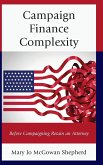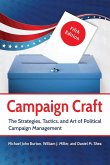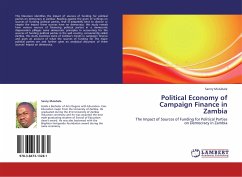19,99 €
inkl. MwSt.
Versandfertig in 1-2 Wochen

10 °P sammeln
- Broschiertes Buch
- Merkliste
- Auf die Merkliste
- Bewerten Bewerten
- Teilen
- Produkt teilen
- Produkterinnerung
- Produkterinnerung
The campaign finance debate is about how we want our democracy to work. But it is conducted in terms of laws, regulations, and court decisions about super PACs, 501(c)(4)s, dark money, and even the IRS. This book explains how those laws and decisions fit into the larger debate about democracy.
Andere Kunden interessierten sich auch für
![Evaluating Campaign Finance Oversight Evaluating Campaign Finance Oversight]() Karen Denice SeboldEvaluating Campaign Finance Oversight112,99 €
Karen Denice SeboldEvaluating Campaign Finance Oversight112,99 €![Campaign Finance Reform Campaign Finance Reform]() Campaign Finance Reform34,99 €
Campaign Finance Reform34,99 €![Campaign Finance Reform Campaign Finance Reform]() Melissa M. SmithCampaign Finance Reform123,99 €
Melissa M. SmithCampaign Finance Reform123,99 €![Campaign Finance Reform Campaign Finance Reform]() Melissa M. SmithCampaign Finance Reform61,99 €
Melissa M. SmithCampaign Finance Reform61,99 €![Campaign Finance Complexity Campaign Finance Complexity]() Mary Jo McGowan ShepherdCampaign Finance Complexity113,99 €
Mary Jo McGowan ShepherdCampaign Finance Complexity113,99 €![Campaign Craft Campaign Craft]() Michael BurtonCampaign Craft49,99 €
Michael BurtonCampaign Craft49,99 €![Political Economy of Campaign Finance in Zambia Political Economy of Campaign Finance in Zambia]() Sanny MulubalePolitical Economy of Campaign Finance in Zambia32,99 €
Sanny MulubalePolitical Economy of Campaign Finance in Zambia32,99 €-
-
-
The campaign finance debate is about how we want our democracy to work. But it is conducted in terms of laws, regulations, and court decisions about super PACs, 501(c)(4)s, dark money, and even the IRS. This book explains how those laws and decisions fit into the larger debate about democracy.
Hinweis: Dieser Artikel kann nur an eine deutsche Lieferadresse ausgeliefert werden.
Hinweis: Dieser Artikel kann nur an eine deutsche Lieferadresse ausgeliefert werden.
Produktdetails
- Produktdetails
- Verlag: OUP US
- Seitenzahl: 230
- Erscheinungstermin: 1. August 2016
- Englisch
- Abmessung: 210mm x 140mm x 14mm
- Gewicht: 321g
- ISBN-13: 9780190274689
- ISBN-10: 0190274689
- Artikelnr.: 47863647
- Herstellerkennzeichnung
- Libri GmbH
- Europaallee 1
- 36244 Bad Hersfeld
- gpsr@libri.de
- Verlag: OUP US
- Seitenzahl: 230
- Erscheinungstermin: 1. August 2016
- Englisch
- Abmessung: 210mm x 140mm x 14mm
- Gewicht: 321g
- ISBN-13: 9780190274689
- ISBN-10: 0190274689
- Artikelnr.: 47863647
- Herstellerkennzeichnung
- Libri GmbH
- Europaallee 1
- 36244 Bad Hersfeld
- gpsr@libri.de
Robert E. Mutch is an independent scholar who specializes in the history of campaign finance. He is the author of Buying the Vote: A History of Campaign Finance Reform.
* Acknowledgments
* Introduction
* 1 What is the campaign finance problem?
* What is the disagreement between supporters and opponents of reform?
* How big a problem is quid pro quo corruption?
* Whether the problem is political corruption or political inequality,
campaign finance is about paying for election campaigns. How much do
they cost?
* Do elections cost a lot more now than they used to?
* Is it true that the candidate with the most money always wins?
* Where do candidates get the money to pay for their campaigns?
* What is the role of political parties?
* How has Congress regulated money in elections?
* What is the state of the Federal Election Campaign Act today?
* 2 Watergate and Buckley v. Valeo
* What was Watergate?
* What was the campaign finance part of Watergate?
* How did Congress change campaign finance law after Watergate?
* Who were Buckley and Valeo?
* Why did Senator Buckley and the other challengers think the 1974
reforms were unconstitutional?
* How did the circuit court decide Buckley v. Valeo?
* How did the Supreme Court decide Buckley v. Valeo?
* How did the challengers, the defenders, and the justices deal with
the reform goals of curbing campaign costs, preventing corruption,
and promoting equality?
* Why is Buckley v. Valeo still important today?
* 3 The rise and fall of public funding
* How does the Presidential Election Campaign Fund work?
* Did Congress come up with the idea of public funding in response to
Watergate?
* What did reformers hope to accomplish by using public funds to pay
for elections?
* Why was Senator Long's public funding bill so controversial?
* If the income tax checkoff was so controversial in the 1960s, how did
it survive the political battles in Congress?
* What happened to the tax incentives for small contributions that
Congress passed in 1971?
* Why did the public funding program pay for the party conventions as
well as the elections?
* Why did Congress repeal public funding for party conventions?
* How does the public funding program treat minor parties?
* How does the public funding program treat independents?
* Did public funding meet its goal of bringing in new, small donors?
* Public funding is also supposed to bring in new candidates. Did the
presidential program do that?
* But participation in the tax checkoff had dropped by 2012. Did the
same thing happen with public opinion?
* What kinds of public funding programs are the states enacting?
* Which states subsidize election campaigns?
* Which cities have public funding programs?
* How does New York City's public funding program work?
* How well did the presidential public funding program work?
* 4 Disclosure and the federal election commission
* What does the FEC do?
* Why did Congress create the Federal Election Commission?
* How does the FEC work? Is it like other independent agencies?
* How well does the current disclosure law work?
* How does the FEC enforce other parts of the FECA?
* Why are there so many partisan deadlocks on the FEC?
* Why has disclosure become so controversial?
* What are the intimidation charges raised by opponents of disclosure?
* 5 Political action committees
* Why do we have PACS? Who created them and why?
* Why did corporations suddenly begin forming PACs in the late 1970s?
* Why did reformers try to curb PACs in the 1980s?
* Did politicians begin refusing PAC contributions in the 1980s?
* Were independent expenditures new?
* What is a connected PAC?
* How do the five categories of connected PACs differ from one another?
* Do business and labor PACs do different things with their money in
elections?
* What are non-connected PACs?
* What do ideological PACs do?
* What do leadership PACs do?
* 6 Super PACs
* Where did the super PAC come from?
* What makes super PACs super?
* What is a hybrid PAC?
* Why is coordination between candidates and super PACs a problem?
* What did Congress do about independent expenditures after Watergate?
* How did Citizens United and SpeechNow make coordination between
candidates and super PACs such a big problem?
* What are the rules against candidates coordinating with super PACs?
* How close did candidates and super PACs get in 2012?
* How did the super PAC change the way presidential candidates ran
their campaigns?
* Stephen Colbert formed a super PAC on his Comedy Central TV show, The
Colbert Report. What was that about?
* Jeb Bush's super PAC did not help him at all. And Hillary Clinton's
super PAC did not help her fend off Bernie Sanders. So how big a deal
are super PACs, really?
* 7 Billionaires
* There seem to be a lot of billionaire donors these days. Is this new?
* What is different about megadonors today?
* How did fundraising by presidential candidates in 2015 differ from
previous elections?
* But Jeb Bush finished 2015 far behind candidates who raised less
money. So were the billionaires really all that important?
* Were billionaires any more important in the Democrats' race?
* What is the Koch brothers' network?
* What did the Koch network do in the 2012 and 2014 elections?
* How are other conservative billionaires becoming active in elections?
* Are liberal billionaires doing anything similar to what the Koch
brothers are doing?
* Are individual liberal billionaires building personal political
operations, as rich conservatives are doing?
* 8 Outside money
* What was soft money?
* Did both parties raise soft money?
* How did the nature of soft money change after 1992?
* What was the McCain-Feingold Act?
* What is a 527?
* Did 527s just replace party soft money?
* What are 501(c) tax-exempt groups?
* What was Wisconsin Right to Life v. FEC?
* Was there still a lot of outside money in the 2008 election?
* How did the FEC weaken disclosure rules for tax-exempt groups?
* What are 501(c)(4)s?
* How did Citizens United change the role of 501(c)s in election?
* What was the controversy over the IRS's scrutiny of applications to
form social welfare groups?
* What did the American Bar Association recommend the IRS do about
political activity by non-political groups?
* 9 Corporations, Unions, and Citizens United
* What can corporations do in elections now that they could not do
before Citizens United?
* Did Citizens United overturn the Tillman Act's ban against political
contributions?
* Did the Tillman Act work? Or did corporations keep making campaign
contributions after it banned them?
* When did corporations and unions begin using their money to influence
elections?
* How did conservatives try to limit labor participation in elections?
* Why did the Department of Justice challenge the legality of labor
PACs in Pipefitters v. United States?
* What was the issue in First National Bank of Boston v. Bellotti?
* Why did the Supreme Court give First Amendment rights of political
speech to corporations in Citizens United?
* How big a change did Citizens United make to the way campaigns are
financed?
* What about corporate personhood? Did Citizens United say corporations
are people?
* Did Citizens United release a flood of corporate money for
independent expenditures?
* Citizens United also permitted unlimited spending by labor unions.
Has that happened?
* Critics of Citizens United also said it would let foreign money into
U.S. elections. Has that happened?
* Is the Republican party financed by business and the Democratic party
by labor?
* What about corporate lobbying? Isn't that at least as big a problem
as campaign finance?
* Is the Republican party financed by business and the Democratic party
by labor?
* Conclusion What Next?
* Why does the future look bright for reform opponents?
* Is there is any chance for reviving public funding for presidential
elections?
* What about public funding for state and city elections? Is that
likely to continue?
* Will small-donor programs be able to counter the surge of rich donors
and democratize campaign finance?
* Well-financed non-party groups seem to be more active than the
parties in recent elections. Are the parties getting weaker?
* Can the FEC be made to work?
* Will disclosure survive?
* There seems to be a lot of support for a constitutional amendment to
overturn Citizens United. Is that likely to happen?
* Why are the prospects for reform so poor?
* The chances of curbing big money in elections would be a lot better
if the 5-4 split on the Supreme Court went the other way. How likely
is that?
* Timeline of campaign finance laws and Supreme Court decisions
* Glossary
* Notes
* Further Reading
* Index
* Introduction
* 1 What is the campaign finance problem?
* What is the disagreement between supporters and opponents of reform?
* How big a problem is quid pro quo corruption?
* Whether the problem is political corruption or political inequality,
campaign finance is about paying for election campaigns. How much do
they cost?
* Do elections cost a lot more now than they used to?
* Is it true that the candidate with the most money always wins?
* Where do candidates get the money to pay for their campaigns?
* What is the role of political parties?
* How has Congress regulated money in elections?
* What is the state of the Federal Election Campaign Act today?
* 2 Watergate and Buckley v. Valeo
* What was Watergate?
* What was the campaign finance part of Watergate?
* How did Congress change campaign finance law after Watergate?
* Who were Buckley and Valeo?
* Why did Senator Buckley and the other challengers think the 1974
reforms were unconstitutional?
* How did the circuit court decide Buckley v. Valeo?
* How did the Supreme Court decide Buckley v. Valeo?
* How did the challengers, the defenders, and the justices deal with
the reform goals of curbing campaign costs, preventing corruption,
and promoting equality?
* Why is Buckley v. Valeo still important today?
* 3 The rise and fall of public funding
* How does the Presidential Election Campaign Fund work?
* Did Congress come up with the idea of public funding in response to
Watergate?
* What did reformers hope to accomplish by using public funds to pay
for elections?
* Why was Senator Long's public funding bill so controversial?
* If the income tax checkoff was so controversial in the 1960s, how did
it survive the political battles in Congress?
* What happened to the tax incentives for small contributions that
Congress passed in 1971?
* Why did the public funding program pay for the party conventions as
well as the elections?
* Why did Congress repeal public funding for party conventions?
* How does the public funding program treat minor parties?
* How does the public funding program treat independents?
* Did public funding meet its goal of bringing in new, small donors?
* Public funding is also supposed to bring in new candidates. Did the
presidential program do that?
* But participation in the tax checkoff had dropped by 2012. Did the
same thing happen with public opinion?
* What kinds of public funding programs are the states enacting?
* Which states subsidize election campaigns?
* Which cities have public funding programs?
* How does New York City's public funding program work?
* How well did the presidential public funding program work?
* 4 Disclosure and the federal election commission
* What does the FEC do?
* Why did Congress create the Federal Election Commission?
* How does the FEC work? Is it like other independent agencies?
* How well does the current disclosure law work?
* How does the FEC enforce other parts of the FECA?
* Why are there so many partisan deadlocks on the FEC?
* Why has disclosure become so controversial?
* What are the intimidation charges raised by opponents of disclosure?
* 5 Political action committees
* Why do we have PACS? Who created them and why?
* Why did corporations suddenly begin forming PACs in the late 1970s?
* Why did reformers try to curb PACs in the 1980s?
* Did politicians begin refusing PAC contributions in the 1980s?
* Were independent expenditures new?
* What is a connected PAC?
* How do the five categories of connected PACs differ from one another?
* Do business and labor PACs do different things with their money in
elections?
* What are non-connected PACs?
* What do ideological PACs do?
* What do leadership PACs do?
* 6 Super PACs
* Where did the super PAC come from?
* What makes super PACs super?
* What is a hybrid PAC?
* Why is coordination between candidates and super PACs a problem?
* What did Congress do about independent expenditures after Watergate?
* How did Citizens United and SpeechNow make coordination between
candidates and super PACs such a big problem?
* What are the rules against candidates coordinating with super PACs?
* How close did candidates and super PACs get in 2012?
* How did the super PAC change the way presidential candidates ran
their campaigns?
* Stephen Colbert formed a super PAC on his Comedy Central TV show, The
Colbert Report. What was that about?
* Jeb Bush's super PAC did not help him at all. And Hillary Clinton's
super PAC did not help her fend off Bernie Sanders. So how big a deal
are super PACs, really?
* 7 Billionaires
* There seem to be a lot of billionaire donors these days. Is this new?
* What is different about megadonors today?
* How did fundraising by presidential candidates in 2015 differ from
previous elections?
* But Jeb Bush finished 2015 far behind candidates who raised less
money. So were the billionaires really all that important?
* Were billionaires any more important in the Democrats' race?
* What is the Koch brothers' network?
* What did the Koch network do in the 2012 and 2014 elections?
* How are other conservative billionaires becoming active in elections?
* Are liberal billionaires doing anything similar to what the Koch
brothers are doing?
* Are individual liberal billionaires building personal political
operations, as rich conservatives are doing?
* 8 Outside money
* What was soft money?
* Did both parties raise soft money?
* How did the nature of soft money change after 1992?
* What was the McCain-Feingold Act?
* What is a 527?
* Did 527s just replace party soft money?
* What are 501(c) tax-exempt groups?
* What was Wisconsin Right to Life v. FEC?
* Was there still a lot of outside money in the 2008 election?
* How did the FEC weaken disclosure rules for tax-exempt groups?
* What are 501(c)(4)s?
* How did Citizens United change the role of 501(c)s in election?
* What was the controversy over the IRS's scrutiny of applications to
form social welfare groups?
* What did the American Bar Association recommend the IRS do about
political activity by non-political groups?
* 9 Corporations, Unions, and Citizens United
* What can corporations do in elections now that they could not do
before Citizens United?
* Did Citizens United overturn the Tillman Act's ban against political
contributions?
* Did the Tillman Act work? Or did corporations keep making campaign
contributions after it banned them?
* When did corporations and unions begin using their money to influence
elections?
* How did conservatives try to limit labor participation in elections?
* Why did the Department of Justice challenge the legality of labor
PACs in Pipefitters v. United States?
* What was the issue in First National Bank of Boston v. Bellotti?
* Why did the Supreme Court give First Amendment rights of political
speech to corporations in Citizens United?
* How big a change did Citizens United make to the way campaigns are
financed?
* What about corporate personhood? Did Citizens United say corporations
are people?
* Did Citizens United release a flood of corporate money for
independent expenditures?
* Citizens United also permitted unlimited spending by labor unions.
Has that happened?
* Critics of Citizens United also said it would let foreign money into
U.S. elections. Has that happened?
* Is the Republican party financed by business and the Democratic party
by labor?
* What about corporate lobbying? Isn't that at least as big a problem
as campaign finance?
* Is the Republican party financed by business and the Democratic party
by labor?
* Conclusion What Next?
* Why does the future look bright for reform opponents?
* Is there is any chance for reviving public funding for presidential
elections?
* What about public funding for state and city elections? Is that
likely to continue?
* Will small-donor programs be able to counter the surge of rich donors
and democratize campaign finance?
* Well-financed non-party groups seem to be more active than the
parties in recent elections. Are the parties getting weaker?
* Can the FEC be made to work?
* Will disclosure survive?
* There seems to be a lot of support for a constitutional amendment to
overturn Citizens United. Is that likely to happen?
* Why are the prospects for reform so poor?
* The chances of curbing big money in elections would be a lot better
if the 5-4 split on the Supreme Court went the other way. How likely
is that?
* Timeline of campaign finance laws and Supreme Court decisions
* Glossary
* Notes
* Further Reading
* Index
* Acknowledgments
* Introduction
* 1 What is the campaign finance problem?
* What is the disagreement between supporters and opponents of reform?
* How big a problem is quid pro quo corruption?
* Whether the problem is political corruption or political inequality,
campaign finance is about paying for election campaigns. How much do
they cost?
* Do elections cost a lot more now than they used to?
* Is it true that the candidate with the most money always wins?
* Where do candidates get the money to pay for their campaigns?
* What is the role of political parties?
* How has Congress regulated money in elections?
* What is the state of the Federal Election Campaign Act today?
* 2 Watergate and Buckley v. Valeo
* What was Watergate?
* What was the campaign finance part of Watergate?
* How did Congress change campaign finance law after Watergate?
* Who were Buckley and Valeo?
* Why did Senator Buckley and the other challengers think the 1974
reforms were unconstitutional?
* How did the circuit court decide Buckley v. Valeo?
* How did the Supreme Court decide Buckley v. Valeo?
* How did the challengers, the defenders, and the justices deal with
the reform goals of curbing campaign costs, preventing corruption,
and promoting equality?
* Why is Buckley v. Valeo still important today?
* 3 The rise and fall of public funding
* How does the Presidential Election Campaign Fund work?
* Did Congress come up with the idea of public funding in response to
Watergate?
* What did reformers hope to accomplish by using public funds to pay
for elections?
* Why was Senator Long's public funding bill so controversial?
* If the income tax checkoff was so controversial in the 1960s, how did
it survive the political battles in Congress?
* What happened to the tax incentives for small contributions that
Congress passed in 1971?
* Why did the public funding program pay for the party conventions as
well as the elections?
* Why did Congress repeal public funding for party conventions?
* How does the public funding program treat minor parties?
* How does the public funding program treat independents?
* Did public funding meet its goal of bringing in new, small donors?
* Public funding is also supposed to bring in new candidates. Did the
presidential program do that?
* But participation in the tax checkoff had dropped by 2012. Did the
same thing happen with public opinion?
* What kinds of public funding programs are the states enacting?
* Which states subsidize election campaigns?
* Which cities have public funding programs?
* How does New York City's public funding program work?
* How well did the presidential public funding program work?
* 4 Disclosure and the federal election commission
* What does the FEC do?
* Why did Congress create the Federal Election Commission?
* How does the FEC work? Is it like other independent agencies?
* How well does the current disclosure law work?
* How does the FEC enforce other parts of the FECA?
* Why are there so many partisan deadlocks on the FEC?
* Why has disclosure become so controversial?
* What are the intimidation charges raised by opponents of disclosure?
* 5 Political action committees
* Why do we have PACS? Who created them and why?
* Why did corporations suddenly begin forming PACs in the late 1970s?
* Why did reformers try to curb PACs in the 1980s?
* Did politicians begin refusing PAC contributions in the 1980s?
* Were independent expenditures new?
* What is a connected PAC?
* How do the five categories of connected PACs differ from one another?
* Do business and labor PACs do different things with their money in
elections?
* What are non-connected PACs?
* What do ideological PACs do?
* What do leadership PACs do?
* 6 Super PACs
* Where did the super PAC come from?
* What makes super PACs super?
* What is a hybrid PAC?
* Why is coordination between candidates and super PACs a problem?
* What did Congress do about independent expenditures after Watergate?
* How did Citizens United and SpeechNow make coordination between
candidates and super PACs such a big problem?
* What are the rules against candidates coordinating with super PACs?
* How close did candidates and super PACs get in 2012?
* How did the super PAC change the way presidential candidates ran
their campaigns?
* Stephen Colbert formed a super PAC on his Comedy Central TV show, The
Colbert Report. What was that about?
* Jeb Bush's super PAC did not help him at all. And Hillary Clinton's
super PAC did not help her fend off Bernie Sanders. So how big a deal
are super PACs, really?
* 7 Billionaires
* There seem to be a lot of billionaire donors these days. Is this new?
* What is different about megadonors today?
* How did fundraising by presidential candidates in 2015 differ from
previous elections?
* But Jeb Bush finished 2015 far behind candidates who raised less
money. So were the billionaires really all that important?
* Were billionaires any more important in the Democrats' race?
* What is the Koch brothers' network?
* What did the Koch network do in the 2012 and 2014 elections?
* How are other conservative billionaires becoming active in elections?
* Are liberal billionaires doing anything similar to what the Koch
brothers are doing?
* Are individual liberal billionaires building personal political
operations, as rich conservatives are doing?
* 8 Outside money
* What was soft money?
* Did both parties raise soft money?
* How did the nature of soft money change after 1992?
* What was the McCain-Feingold Act?
* What is a 527?
* Did 527s just replace party soft money?
* What are 501(c) tax-exempt groups?
* What was Wisconsin Right to Life v. FEC?
* Was there still a lot of outside money in the 2008 election?
* How did the FEC weaken disclosure rules for tax-exempt groups?
* What are 501(c)(4)s?
* How did Citizens United change the role of 501(c)s in election?
* What was the controversy over the IRS's scrutiny of applications to
form social welfare groups?
* What did the American Bar Association recommend the IRS do about
political activity by non-political groups?
* 9 Corporations, Unions, and Citizens United
* What can corporations do in elections now that they could not do
before Citizens United?
* Did Citizens United overturn the Tillman Act's ban against political
contributions?
* Did the Tillman Act work? Or did corporations keep making campaign
contributions after it banned them?
* When did corporations and unions begin using their money to influence
elections?
* How did conservatives try to limit labor participation in elections?
* Why did the Department of Justice challenge the legality of labor
PACs in Pipefitters v. United States?
* What was the issue in First National Bank of Boston v. Bellotti?
* Why did the Supreme Court give First Amendment rights of political
speech to corporations in Citizens United?
* How big a change did Citizens United make to the way campaigns are
financed?
* What about corporate personhood? Did Citizens United say corporations
are people?
* Did Citizens United release a flood of corporate money for
independent expenditures?
* Citizens United also permitted unlimited spending by labor unions.
Has that happened?
* Critics of Citizens United also said it would let foreign money into
U.S. elections. Has that happened?
* Is the Republican party financed by business and the Democratic party
by labor?
* What about corporate lobbying? Isn't that at least as big a problem
as campaign finance?
* Is the Republican party financed by business and the Democratic party
by labor?
* Conclusion What Next?
* Why does the future look bright for reform opponents?
* Is there is any chance for reviving public funding for presidential
elections?
* What about public funding for state and city elections? Is that
likely to continue?
* Will small-donor programs be able to counter the surge of rich donors
and democratize campaign finance?
* Well-financed non-party groups seem to be more active than the
parties in recent elections. Are the parties getting weaker?
* Can the FEC be made to work?
* Will disclosure survive?
* There seems to be a lot of support for a constitutional amendment to
overturn Citizens United. Is that likely to happen?
* Why are the prospects for reform so poor?
* The chances of curbing big money in elections would be a lot better
if the 5-4 split on the Supreme Court went the other way. How likely
is that?
* Timeline of campaign finance laws and Supreme Court decisions
* Glossary
* Notes
* Further Reading
* Index
* Introduction
* 1 What is the campaign finance problem?
* What is the disagreement between supporters and opponents of reform?
* How big a problem is quid pro quo corruption?
* Whether the problem is political corruption or political inequality,
campaign finance is about paying for election campaigns. How much do
they cost?
* Do elections cost a lot more now than they used to?
* Is it true that the candidate with the most money always wins?
* Where do candidates get the money to pay for their campaigns?
* What is the role of political parties?
* How has Congress regulated money in elections?
* What is the state of the Federal Election Campaign Act today?
* 2 Watergate and Buckley v. Valeo
* What was Watergate?
* What was the campaign finance part of Watergate?
* How did Congress change campaign finance law after Watergate?
* Who were Buckley and Valeo?
* Why did Senator Buckley and the other challengers think the 1974
reforms were unconstitutional?
* How did the circuit court decide Buckley v. Valeo?
* How did the Supreme Court decide Buckley v. Valeo?
* How did the challengers, the defenders, and the justices deal with
the reform goals of curbing campaign costs, preventing corruption,
and promoting equality?
* Why is Buckley v. Valeo still important today?
* 3 The rise and fall of public funding
* How does the Presidential Election Campaign Fund work?
* Did Congress come up with the idea of public funding in response to
Watergate?
* What did reformers hope to accomplish by using public funds to pay
for elections?
* Why was Senator Long's public funding bill so controversial?
* If the income tax checkoff was so controversial in the 1960s, how did
it survive the political battles in Congress?
* What happened to the tax incentives for small contributions that
Congress passed in 1971?
* Why did the public funding program pay for the party conventions as
well as the elections?
* Why did Congress repeal public funding for party conventions?
* How does the public funding program treat minor parties?
* How does the public funding program treat independents?
* Did public funding meet its goal of bringing in new, small donors?
* Public funding is also supposed to bring in new candidates. Did the
presidential program do that?
* But participation in the tax checkoff had dropped by 2012. Did the
same thing happen with public opinion?
* What kinds of public funding programs are the states enacting?
* Which states subsidize election campaigns?
* Which cities have public funding programs?
* How does New York City's public funding program work?
* How well did the presidential public funding program work?
* 4 Disclosure and the federal election commission
* What does the FEC do?
* Why did Congress create the Federal Election Commission?
* How does the FEC work? Is it like other independent agencies?
* How well does the current disclosure law work?
* How does the FEC enforce other parts of the FECA?
* Why are there so many partisan deadlocks on the FEC?
* Why has disclosure become so controversial?
* What are the intimidation charges raised by opponents of disclosure?
* 5 Political action committees
* Why do we have PACS? Who created them and why?
* Why did corporations suddenly begin forming PACs in the late 1970s?
* Why did reformers try to curb PACs in the 1980s?
* Did politicians begin refusing PAC contributions in the 1980s?
* Were independent expenditures new?
* What is a connected PAC?
* How do the five categories of connected PACs differ from one another?
* Do business and labor PACs do different things with their money in
elections?
* What are non-connected PACs?
* What do ideological PACs do?
* What do leadership PACs do?
* 6 Super PACs
* Where did the super PAC come from?
* What makes super PACs super?
* What is a hybrid PAC?
* Why is coordination between candidates and super PACs a problem?
* What did Congress do about independent expenditures after Watergate?
* How did Citizens United and SpeechNow make coordination between
candidates and super PACs such a big problem?
* What are the rules against candidates coordinating with super PACs?
* How close did candidates and super PACs get in 2012?
* How did the super PAC change the way presidential candidates ran
their campaigns?
* Stephen Colbert formed a super PAC on his Comedy Central TV show, The
Colbert Report. What was that about?
* Jeb Bush's super PAC did not help him at all. And Hillary Clinton's
super PAC did not help her fend off Bernie Sanders. So how big a deal
are super PACs, really?
* 7 Billionaires
* There seem to be a lot of billionaire donors these days. Is this new?
* What is different about megadonors today?
* How did fundraising by presidential candidates in 2015 differ from
previous elections?
* But Jeb Bush finished 2015 far behind candidates who raised less
money. So were the billionaires really all that important?
* Were billionaires any more important in the Democrats' race?
* What is the Koch brothers' network?
* What did the Koch network do in the 2012 and 2014 elections?
* How are other conservative billionaires becoming active in elections?
* Are liberal billionaires doing anything similar to what the Koch
brothers are doing?
* Are individual liberal billionaires building personal political
operations, as rich conservatives are doing?
* 8 Outside money
* What was soft money?
* Did both parties raise soft money?
* How did the nature of soft money change after 1992?
* What was the McCain-Feingold Act?
* What is a 527?
* Did 527s just replace party soft money?
* What are 501(c) tax-exempt groups?
* What was Wisconsin Right to Life v. FEC?
* Was there still a lot of outside money in the 2008 election?
* How did the FEC weaken disclosure rules for tax-exempt groups?
* What are 501(c)(4)s?
* How did Citizens United change the role of 501(c)s in election?
* What was the controversy over the IRS's scrutiny of applications to
form social welfare groups?
* What did the American Bar Association recommend the IRS do about
political activity by non-political groups?
* 9 Corporations, Unions, and Citizens United
* What can corporations do in elections now that they could not do
before Citizens United?
* Did Citizens United overturn the Tillman Act's ban against political
contributions?
* Did the Tillman Act work? Or did corporations keep making campaign
contributions after it banned them?
* When did corporations and unions begin using their money to influence
elections?
* How did conservatives try to limit labor participation in elections?
* Why did the Department of Justice challenge the legality of labor
PACs in Pipefitters v. United States?
* What was the issue in First National Bank of Boston v. Bellotti?
* Why did the Supreme Court give First Amendment rights of political
speech to corporations in Citizens United?
* How big a change did Citizens United make to the way campaigns are
financed?
* What about corporate personhood? Did Citizens United say corporations
are people?
* Did Citizens United release a flood of corporate money for
independent expenditures?
* Citizens United also permitted unlimited spending by labor unions.
Has that happened?
* Critics of Citizens United also said it would let foreign money into
U.S. elections. Has that happened?
* Is the Republican party financed by business and the Democratic party
by labor?
* What about corporate lobbying? Isn't that at least as big a problem
as campaign finance?
* Is the Republican party financed by business and the Democratic party
by labor?
* Conclusion What Next?
* Why does the future look bright for reform opponents?
* Is there is any chance for reviving public funding for presidential
elections?
* What about public funding for state and city elections? Is that
likely to continue?
* Will small-donor programs be able to counter the surge of rich donors
and democratize campaign finance?
* Well-financed non-party groups seem to be more active than the
parties in recent elections. Are the parties getting weaker?
* Can the FEC be made to work?
* Will disclosure survive?
* There seems to be a lot of support for a constitutional amendment to
overturn Citizens United. Is that likely to happen?
* Why are the prospects for reform so poor?
* The chances of curbing big money in elections would be a lot better
if the 5-4 split on the Supreme Court went the other way. How likely
is that?
* Timeline of campaign finance laws and Supreme Court decisions
* Glossary
* Notes
* Further Reading
* Index
